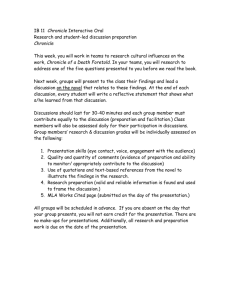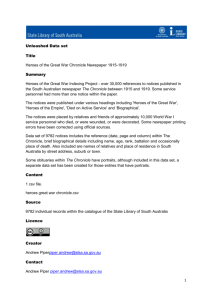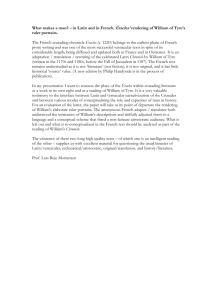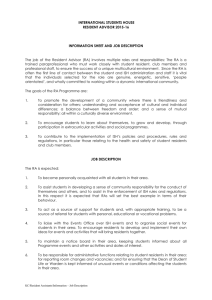When College Is Free, or Free(ish)
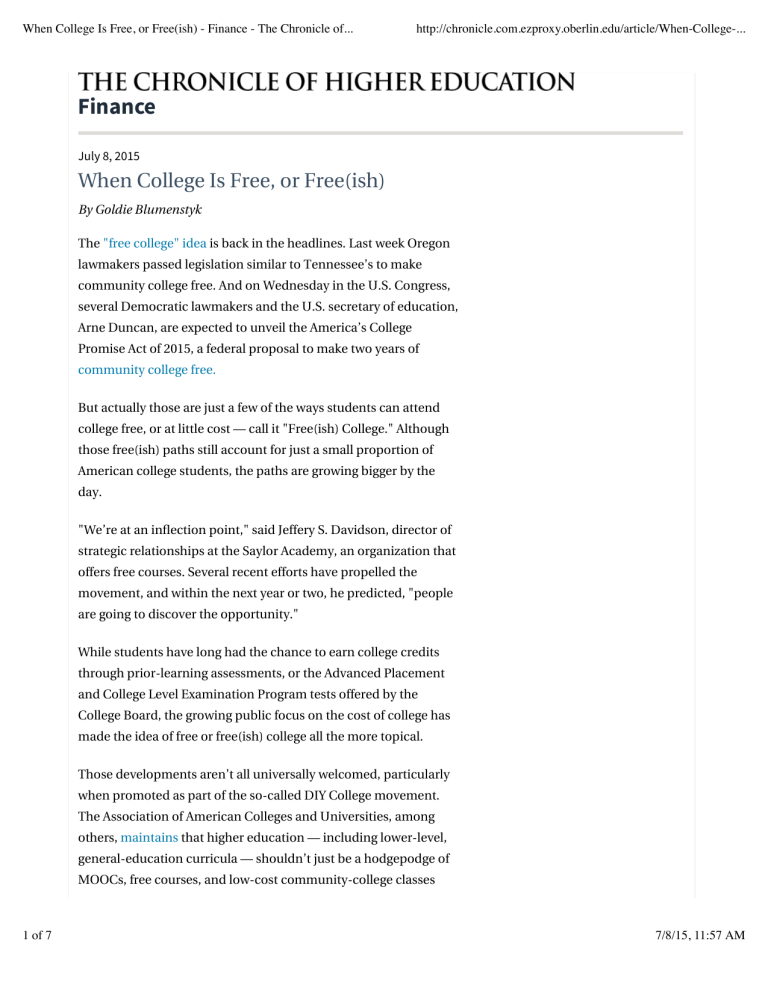
When College Is Free, or Free(ish) - Finance - The Chronicle of...
http://chronicle.com.ezproxy.oberlin.edu/article/When-College-...
Finance
July 8, 2015
When College Is Free, or Free(ish)
By Goldie Blumenstyk
The "free college" idea is back in the headlines. Last week Oregon lawmakers passed legislation similar to Tennessee’s to make community college free. And on Wednesday in the U.S. Congress, several Democratic lawmakers and the U.S. secretary of education,
Arne Duncan, are expected to unveil the America’s College
Promise Act of 2015, a federal proposal to make two years of community college free.
But actually those are just a few of the ways students can attend college free, or at little cost — call it "Free(ish) College." Although those free(ish) paths still account for just a small proportion of
American college students, the paths are growing bigger by the day.
"We’re at an in fl ection point," said Jeffery S. Davidson, director of strategic relationships at the Saylor Academy, an organization that offers free courses. Several recent efforts have propelled the movement, and within the next year or two, he predicted, "people are going to discover the opportunity."
While students have long had the chance to earn college credits through prior-learning assessments, or the Advanced Placement and College Level Examination Program tests offered by the
College Board, the growing public focus on the cost of college has made the idea of free or free(ish) college all the more topical.
Those developments aren’t all universally welcomed, particularly when promoted as part of the so-called DIY College movement.
The Association of American Colleges and Universities, among others, maintains that higher education — including lower-level, general-education curricula — shouldn’t just be a hodgepodge of
MOOCs, free courses, and low-cost community-college classes
1 of 7 7/8/15, 11:57 AM
When College Is Free, or Free(ish) - Finance - The Chronicle of...
http://chronicle.com.ezproxy.oberlin.edu/article/When-College-...
that students cobble together.
Mindful of that concern, many providers of those courses say they see themselves as a partial alternative to college, not a replacement.
Here are some of the most prominent free and free(ish) options:
University of the People
This all-online institution calls itself the world’s fi rst nonpro fi t, tuition-free university "dedicated to opening the gates to higher education for all individuals." The university, which opened in
2009, now enrolls about 2,000 students, who pay nothing to attend, $50 to apply, and just $100 per course for an end-of-year examination, if they have the money.
While aimed primarily at students in parts of the world with fewer education options than in the United States, the university is approved by the State of California, is accredited, and has attracted about a quarter of its students from the United States.
Free Community College
Tennessee paved the way for free community college last year, with the creation of the Tennessee Promise, a program that pays the cost of tuition and fees not covered by Pell Grants or state fi nancial aid. Students may use the scholarship at any of the state’s
13 community colleges, 27 colleges of applied technology, or other eligible institutions offering associate degrees. The program begins this fall.
Last week Oregon legislators followed suit, passing a bill that will waive tuition for students at community colleges as long as they have fewer than 90 college credits. As with the Tennessee program, the Oregon Promise scholarship will kick in after a student has received all other eligible federal and state aid.
To qualify for the award, students must have a 2.5 grade-point average in high school and maintain it in college. Each will be charged a $50 "copay" per course. The program will start in the
2016-17 academic year, but with just a $10-million budget allocation, it remains to be seen how extensive the program will
2 of 7 7/8/15, 11:57 AM
When College Is Free, or Free(ish) - Finance - The Chronicle of...
http://chronicle.com.ezproxy.oberlin.edu/article/When-College-...
be.
The state’s Higher Education Coordinating Commission, which will carry out the program, may give preferences to students in certain high schools and districts. Depending on the demand, it may be even more generous than Tennessee’s, with the potential to offer grants of up to $1,000 each to needy students on top of the free tuition.
Ben Cannon, executive director of the commission, said lawmakers added the extra grant money to help ensure that "the tuition bene fi ts under the program didn’t fl ow exclusively to higher-income students, given the signi fi cant nontuition barriers that face many students who receive Pell [Grants]."
Free Community College — for Some
Public two-year colleges in California have been charging students to attend since 1984, but thanks to Pell Grants and Cal Grants, and the colleges’ need-based "fee waiver" program, nearly 46 percent of all community-college students in the state don’t pay tuition.
In the 2013-14 academic year, the latest for which fi gures are available, more than one million fi nancially needy Californians received a free education in the community colleges. Tuition there, by the way, is $46 a credit, among the lowest in the country.
ACE’s Alternative-Credit Project
With a $1.9-million grant from the Bill & Melinda Gates
Foundation, the College Credit Recommendation Service of the
American Council on Education is building what it calls an
"ecosystem" of about 100 lower-division courses developed by nonaccredited providers that would be accepted for credit by accredited colleges and universities.
In December the project selected an initial 25 institutions
(including two systems) as founding partners, which means they’ve agreed to grant credit for "all or most" of the courses at no or low cost to the students who have passed them. Within the next two weeks, the council plans to announce an additional 15, according to Deborah M. Seymour, the council’s assistant vice
3 of 7 7/8/15, 11:57 AM
When College Is Free, or Free(ish) - Finance - The Chronicle of...
http://chronicle.com.ezproxy.oberlin.edu/article/When-College-...
president for education attainment and innovation.
The courses now under evaluation were developed by seven companies and organizations, including a MOOC provider (edX) and a giant publishing company (Pearson). A few that initially signed up have dropped out, she said. The project has also already rejected some courses. The fi nal list will be made public this fall.
The council already makes credit evaluations for courses developed by the U.S. military and companies like McDonald’s.
Ms. Seymour declined to say how many credits it authorizes for transfer a year. "We consider that proprietary," she said.
The new project builds on that expertise. Ms Seymour said the program’s goal is to remove fi nancial and bureaucratic barriers for students. Even with the new courses, she said, she still doubts that a student could use ACE-approved courses as a substitute for college. "This creates a clear pathway," she said, but "I still can’t see a full degree, even at the associate’s level."
Saylor Academy
The academy, backed by the Saylor Foundation, has recruited professors from around the country to create online courses in a variety of subjects and to offer them free on its website. Saylor has submitted 20 courses for approval to the ACE alternative-credit project.
In addition, 11 of its courses (worth a total of 34 credits, or the equivalent of more than a year of college) were previously approved for credit by either the American Council on Education or the separate National College Credit Recommendation Service.
Students who pass are guaranteed that the credits will transfer to the academy’s 13 college partners.
Besides a $25 fee for services by the test-monitoring company Proctor U, the only cost for students is the price of a self-addressed stamped envelope for transcripts for the courses approved by the credit-recommendation service, or at least $40 for ACE transcripts.
Saylor also has a set of courses designed for students who plan to
4 of 7 7/8/15, 11:57 AM
When College Is Free, or Free(ish) - Finance - The Chronicle of...
http://chronicle.com.ezproxy.oberlin.edu/article/When-College-...
obtain credits via third-party assessments, such as those offered by the College Level Examination Program, or by institutions like
Excelsior or Thomas Edison State Colleges. Some of the courses are designed to fi ll speci fi c degree pathways at those institutions.
More than 100,000 people have taken Saylor courses, though only a few hundred of them have obtained college credit. The academy, a part of the foundation’s focus on promoting open educational resources, is eager to advance its credit-focused ventures.
Through an arrangement with an as-yet-undisclosed corporate partner, it expects this fall to bring 10 more courses to ACE for review. The corporate partner has also promised to then promote the courses to its employees and others.
StraighterLine
This for-pro fi t company offers an unusual low-cost option, charging a $99-a-month subscription plus a $49-per-course fee.
StraighterLine’s offerings now total 60 courses. Its founder, Burck
Smith, said that with its approach, a student risks very little fi nancially "until you succeed." At current prices, 10 courses a year costs a student $1,300. The company also provides mentoring for students.
More than 80 colleges have signed on with StraighterLine as partners, which means they’ve formally agreed to accept the credits, often as part of particular degrees.
"You can get half your degree with us," said Mr. Smith, although he acknowledged that most students use the company’s courses for smaller parts of their education. Last year 13,000 took at least one StraighterLine course, he said, and students have received credit for the courses at more than 600 colleges. The company is also one of the seven providers working with the ACE project.
Goldie Blumenstyk writes about the intersection of business and higher education. Check out www.goldieblumenstyk.com
for information on her new book about the higher-education crisis; follow her on Twitter @GoldieStandard; or email her at goldie@chronicle.com.
5 of 7 7/8/15, 11:57 AM
When College Is Free, or Free(ish) - Finance - The Chronicle of...
http://chronicle.com.ezproxy.oberlin.edu/article/When-College-...
10 Comments
♥ Recommend
The Chronicle of Higher Education
⤤ Share
Join the discussion…
!
Login
Sort by Oldest tlf55 • 5 hours ago
Tulsa, Ok made community college free in 2008 for its area students and included an element of public service. It has been very successful.
1 • Reply • Share › ilhan2000 • 4 hours ago
Be careful.
Free is not a good thing.
Free but not valuable education is waste of time .
Just be careful.
1 • Reply • Share ›
11134078 > ilhan2000 • an hour ago
That's funny. In the days when the College of the City of New York was free (and hard to get into) it produced more Nobel winners than Harvard.
Free was a good thing. It can be good again.
2 • Reply • Share ›
11167997 • 3 hours ago
Virtually none of these programs, or the hustlers, will tell us precisely what students will learn in operational-verb terms. We get test proxies or completion proxies, but no student learning outcomes, or, if a half-attempt is made, no student learning outcomes that are credible.
1 • Reply • Share ›
_perplexed_
• an hour ago
So much talk about courses, so little about curriculum.
•
Reply
•
Share › klsfriend • an hour ago
One should always remember there's no such thing as a free lunch (or free anything). Someone is paying for goods and services rendered. To speak of education being "free" to students simply means someone else is paying their tab. One can argue the merits of that arrangement but one should never be naive enough to believe anything in the process is free.
2 • Reply • Share ›
Feudi Pandola > klsfriend
Yep...ain't no such thing as "free college". Only a fool would believe otherwise.
• Reply • Share ›
• a minute ago willynilly
• an hour ago
All of these ideas about providing free college to qualifying students are good in that they will squeeze more life out of the fraudulent, scandal ridden for-profit ripo ff schools - and perhaps be the final nail in their co ffi n. But can the taxpayer a ff ord to cover the cost of this new benefit.
• Reply • Share › amarkley
• 25 minutes ago
Don't forget schools like College of the Ozarks and Berea College where there is no tuition to pay. Students are required to do work on campus.
• Reply • Share › thmed
• 12 minutes ago
6 of 7 7/8/15, 11:57 AM
When College Is Free, or Free(ish) - Finance - The Chronicle of...
http://chronicle.com.ezproxy.oberlin.edu/article/When-College-...
7 of 7 7/8/15, 11:57 AM
